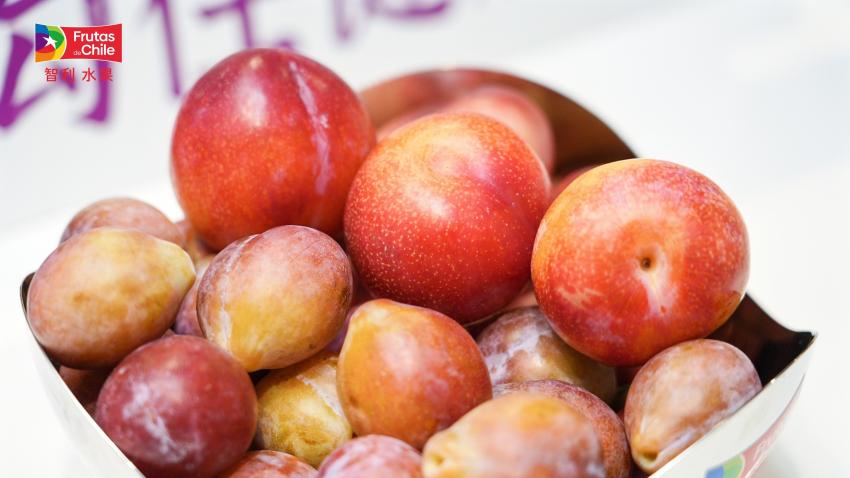You are here
Back to topFirst Specific Promotional Campaign for Chilean Nectarines Worldwide Launched in China

On March 16, Charif Christian Carvajal, Director of Marketing for Europe and Asia at the Chilean Fruit Exporters Association (ASOEX), and Patti Sun, CEO of Publicis Betterway, teamed up to give an online lecture to listeners of Produce Report. In the lecture, the pair provided an update on Chilean nectarine exports to China and this season’s promotional activities. As well as the regular WeChat channel, the lecture was also simultaneously live streamed to viewers via the Yizhibo platform.

This season, ASOEX initiated a pilot promotional campaign for fresh nectarines in China, in conjunction with ProChile and the Chilean Ministry of Agriculture, under the slogan “Chilean nectarines spring up your life” and a visual of a young woman running to highlight the healthy and energy-giving aspects of the fruit. This represents the first time that the Chilean fruit industry has specifically promoted nectarines in any market around the world. This pilot promotional campaign comprises a range of activities, including a tasting event at a gym in Shanghai where a fitness model distributed nectarines and customers were invited to share the photos on their WeChat Moments in return for the chance to win prizes. On-ground and in-store activities have also been conducted at Guangzhou’s Jiangnan Wholesale Market, seven Walmart stores in Shenzhen, and five HEMA stores in Shanghai to give Chinese consumers the opportunity to experience Chilean nectarines.



Nectarines are one of the emerging areas of focus for the Chilean fruit industry. In the 2016–2017 season, Chile exported 62,107 tons of nectarines, representing an 8% increase over the previous season and a 2.5-fold increase over three years prior. Chile currently has 5,340 hectares of nectarine plantations, with the growing areas concentrated in the center of the country in the Santiago Metropolitan and O’Higgins regions. Chilean nectarines are available from December to March and span a wide array of different varieties, such as August Red (5,572 tons in 2016/2017, −6% vs 2015/2016), Venus (4,771 tons, −6%), Arctic Snow (3,634 tons, +42%), Giant Pearl (2,530 tons, +7%), and Bright Pearl (2,351 tons, +21%), including both white- and yellow-fleshed varieties.

The main export market last season was USA/Canada (25,616 tons, 41%), followed by Asia (13,755 tons, 22%), Latin America (12,439 tons, 20%), and Europe (10,298 tons, 17%). While export volumes to the other regions in 2016–2017 remained almost static relative to the previous season, that to Asia saw a staggering 45% increase. In particular, the export volume to mainland China and Hong Kong increased from 5,232 tons in 2015–2016 to 7,730 tons in 2016–2017 (+48%), accounting for 56% of the total nectarines exported from Chile to Asia last season. Many of the sea shipments to China this year have used faster vessels to cut down on transit times.
Nectarines are a relatively new product on the Chinese market, but according to Mr. Carvajal exporters have reported very good results in terms of the sweetness and crunchiness of Chilean nectarines when evaluating the fruits.

Overall, Chile is the largest exporter of fresh fruit in the southern hemisphere, with 82 million consumers around the world eating Chilean fruits every day. Chilean growers produce a wide variety of fruits, especially temperate fruits, throughout the entire year. In particular, the country is the world’s biggest exporter of blueberries (103,687 tons for the 2016–2017 season), cherries (95,289 tons), table grapes (732,663 tons), and plums (99,452 tons), and in 2016 surpassed Thailand to become the #1 supplier of fruit to China.
Fresh fruit represents 32% of Chilean food and beverage exports, corresponding to 5.2 billion USD, with processed fruit accounting for an additional 12%. This is a young and very export-oriented industry whose shipments have increased more than tenfold since 1980 and that directly employs 8.3% of the country’s population. With current fresh fruit exports reaching 2.7 million tons annually, over 100 countries around the globe receive 30 species of Chilean fruit via more than 1,700 importers and distributors. The main export markets for Chilean fruit are the USA (927,158 tons, 35%), Europe (602,340 tons, 23%), Latin America (516,992 tons, 20%), and Asia (479,617 tons, 18%).

The pilot nectarine campaign follows on the back of major promotional activities for blueberries and cherries. Chile is a key supplier of counterseasonal produce to China and the industry has been devoting considerable efforts and investing substantial resources to promote its fresh fruit to Chinese consumers. These activities have been funded by both the private and public sectors, and ASOEX and its members are currently evaluating the results. In the future, ASOEX aims to solidify and strengthen Chile’s position in China, especially in terms of table grapes, cherries, avocadoes, plums, kiwifruit, apples, and blueberries. Mr. Carvajal invited traders interested in importing Chilean nectarines or other fruits to contact ASOEX to learn more. Interested viewers can watch a replay of the live stream of the lecture at this link.
Image source: MZMC, ASOEX














Add new comment